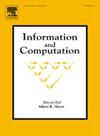IF 1
4区 计算机科学
Q3 COMPUTER SCIENCE, THEORY & METHODS
引用次数: 0
摘要
有限自动机中的计数能力通常由两个正交扩展提供:添加一个可以在任何点测试为零的计数器,或者添加只在运行结束时测试相等的z值计数器。本文介绍了两种计数器扩展的有限自动机。它们被称为Parikh单计数器自动机(POCA):“Parikh”部分指的是运行结束时对计数器的评估,“One-Counter”部分指的是运行期间可以测试的单个计数器。研究了它们在确定性和非确定性变量下的表达性;它特别表明,在原始模型中存在确定性的POCA语言,如果没有非确定性,它们就无法表达。对自然决策问题也进行了研究;引人注目的是,它们中的大多数并不比原始模型更难。还考虑了非空性的参数化版本。本文章由计算机程序翻译,如有差异,请以英文原文为准。
Parikh one-counter automata
Counting abilities in finite automata are traditionally provided by two orthogonal extensions: adding a single counter that can be tested for zeroness at any point, or adding -valued counters that are tested for equality only at the end of runs. In this paper, finite automata extended with both types of counters are introduced. They are called Parikh One-Counter Automata (POCA): the “Parikh” part referring to the evaluation of counters at the end of runs, and the “One-Counter” part to the single counter that can be tested during runs.
Their expressiveness, in the deterministic and nondeterministic variants, is investigated; it is shown in particular that there are deterministic POCA languages that cannot be expressed without nondeterminism in the original models. The natural decision problems are also studied; strikingly, most of them are no harder than in the original models. A parametric version of nonemptiness is also considered.
求助全文
通过发布文献求助,成功后即可免费获取论文全文。
去求助
来源期刊

Information and Computation
工程技术-计算机:理论方法
CiteScore
2.30
自引率
0.00%
发文量
119
审稿时长
140 days
期刊介绍:
Information and Computation welcomes original papers in all areas of theoretical computer science and computational applications of information theory. Survey articles of exceptional quality will also be considered. Particularly welcome are papers contributing new results in active theoretical areas such as
-Biological computation and computational biology-
Computational complexity-
Computer theorem-proving-
Concurrency and distributed process theory-
Cryptographic theory-
Data base theory-
Decision problems in logic-
Design and analysis of algorithms-
Discrete optimization and mathematical programming-
Inductive inference and learning theory-
Logic & constraint programming-
Program verification & model checking-
Probabilistic & Quantum computation-
Semantics of programming languages-
Symbolic computation, lambda calculus, and rewriting systems-
Types and typechecking
 求助内容:
求助内容: 应助结果提醒方式:
应助结果提醒方式:


